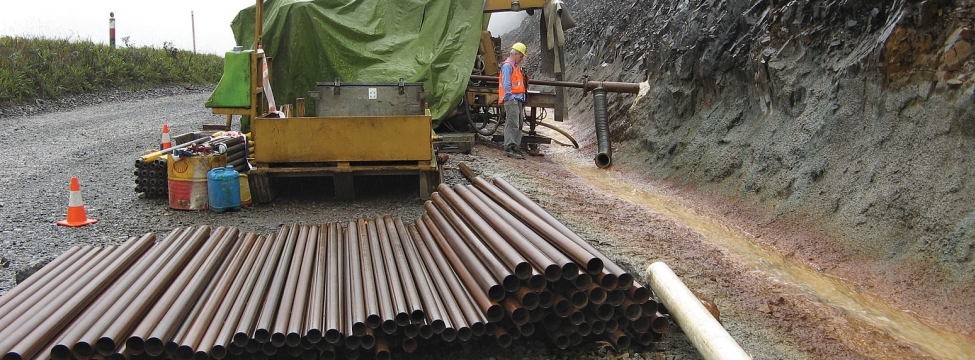To serve you better, our new website displays information specific to your location.
Please visit the site and bookmark it for future use.
Drainage measures for ensuring the stability of the proposed cutback at Ok Tedi mine
The Ok Tedi copper-gold mine in Papua, New Guinea is situated within a seismically active, mountainous region of extremely high rainfall. The current open pit is transected by several large faults, and the rock mass conditions are complex. Material permeabilities are variable, with considerable contrast within the major rock types and fault zones. The pit is being progressively deepened with ongoing mining, and a cutback of the West Wall is being considered, which would result in a final wall height of nearly 1000m.
The main factors affecting the stability of the West Wall cutback are:
• the quality of the various materials within the wall
• the position and nature of major structures
• the pore water pressure distribution behind the wall
Of these factors, only the pore pressure distribution can be adjusted to enhance stability. In discussions with the client, SRK devised a phased modelling approach to assess the stability of the cutback design for the West Wall, and to investigate passive drainage requirements for ensuring stability. The modelling involved an iterative series of numerical analyses to assess the effectiveness of a range of drainhole designs with carefully selected spacings and lengths.
The phased modelling approach included the following steps:
1. Initial slope stability analyses of two sections, using small-strain finite element analysis (Phase2 software) to determine the approximate position of the groundwater level (i.e. distance behind the face) and the pore pressure distributions required to maintain an acceptable factor of safety within the West Wall cutback design.
2. Unsaturated 2D and 3D finite element flow modelling, using FEFLOW® software, to determine the drainhole configurations required to achieve the pore pressure distribution that the initial Phase2 modelling indicated will allow for a stable West Wall cutback. Identifying these requirements allowed the client to assess whether it was possible to implement the necessary drainage requirements within the time periods under consideration during the cutback.
3. Conducting confirmatory Phase2 analyses, using the results from the FEFLOW modelling to provide better groundwater inputs and to confirm the lateral (i.e. out of section) spacing of drainholes required to maintain suitable wall stability. SRK performed the lateral spacing assessment using the groundwater conditions in sections halfway between the drainholes, as the 3D FEFLOW® modelling indicated.
Based on the approximate expected mining period of the West Wall cutback, four excavation stages of one-year periods each were defined for this modelling exercise. Horizontal drains were activated sequentially in the model, together with the excavation sequence to simulate the proposed mining. The drainage designs required to maintain stability of the current cutback design at a suitable factor of safety were identified.
Ian de Bruyn: idebruyn@srk.com.au
|
You can download a PDF of the entire |
PDF A4
|
PDF Letter
|
|
|
|
Our newsletters focus on specific areas of interest to earth resource professionals and clients. Each is available as an Adobe Acrobat PDF file. If you don't already have Adobe's PDF reader, you can download it free.


